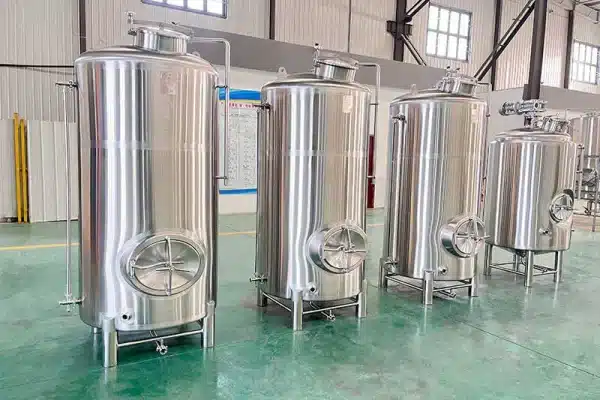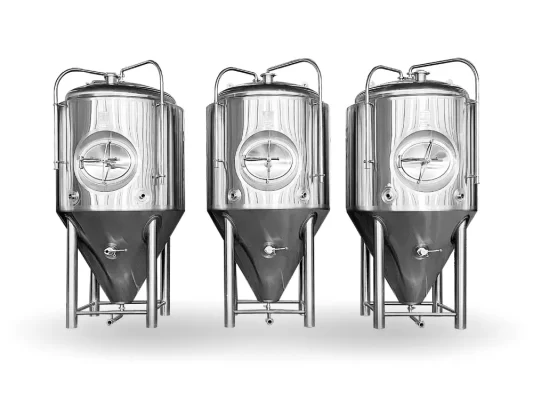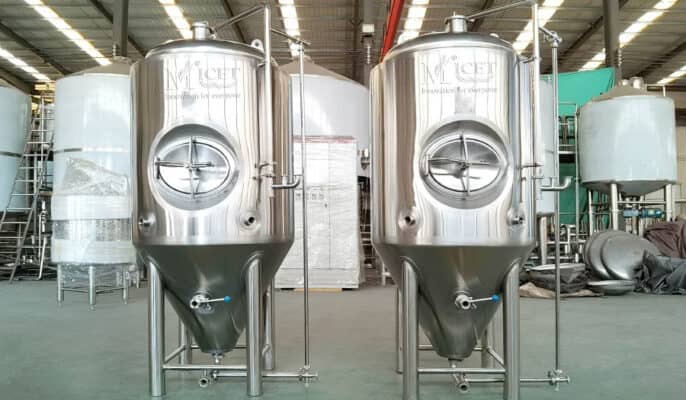Producing consistent, high-quality kombucha at scale is challenging. Manual brewing frequently leads to unstable fermentation, uneven carbonation, contamination risks, and unpredictable product quality. To overcome these challenges, producers are shifting toward automated kombucha brewing machines designed for precision, consistency, and scalability.
Kombucha brewing machines are automated systems used for fermenting kombucha. They precisely control temperature, maintain hygienic conditions, and automate fermentation processes. Suitable for commercial production or ambitious homebrewers, these machines ensure consistent results, higher safety, and improved product quality across batches.
What Is a Kombucha Brewing Machine?
A kombucha brewing machine integrates essential fermentation equipment into one automated unit, simplifying the brewing process and improving consistency. Typical features include stainless steel fermenters, temperature-controlled systems, digital monitoring interfaces, spigots, thermowells, and airlocks. This equipment enables precise control over the kombucha brewing process, from initial fermentation to secondary carbonation.

Unlike traditional kombucha brewing kits that utilize plastic buckets and glass carboys, professional machines offer enhanced durability, hygienic construction, and greater scalability. Breweries employing these machines can reliably scale production from small batches of 6 gallons to commercial capacities of over 60 gallons, without sacrificing quality or safety.
Why Temperature Control Is Essential in Kombucha Brewing
Stable temperature is fundamental in kombucha fermentation. Optimal fermentation occurs between 24°C to 29°C (75°F to 85°F), where the symbiotic culture of bacteria and yeast (SCOBY) remains most active. Outside this range, fermentation slows, and flavor quality diminishes, posing risks of contamination and inconsistent results.
Kombucha brewing machines address these issues through integrated temperature-controlled systems. Stainless steel fermenters typically feature glycol cooling jackets or electric heating wraps connected to digital controllers. These precise controls minimize temperature fluctuations, protecting the SCOBY and ensuring robust probiotic development and consistent flavor.
Essential Equipment for Commercial Kombucha Production
Professional kombucha production requires specialized equipment tailored to volume and quality control demands:
| 設備 | 目的 |
|---|---|
| ステンレス製発酵槽 | Hygienic fermentation vessels, inert surfaces |
| Thermowell | Secure temperature probe placement |
| 栓 | Sanitary transfer of kombucha |
| Glycol cooling jacket | Accurate temperature management |
| pH monitoring tools | Ensuring safe fermentation acidity |
| エアロック | 汚染を防ぐ |
| ボトリング設備 | Secondary fermentation and carbonation |
Investing in such equipment helps ensure consistent kombucha quality, simplifies compliance with safety standards, and supports expansion from small-scale homebrewing into full commercial production.
Stainless Steel Fermenters: Why They Are Superior
ステンレス製発酵槽 significantly outperform plastic and glass alternatives. They are inert, food-grade, easy to sanitize, resistant to corrosion, and effectively prevent unwanted oxygen exposure. This ensures the kombucha fermentation environment remains stable and uncontaminated, crucial for commercial brewing.
Moreover, stainless steel fermenters integrate seamlessly with advanced temperature-controlled systems, enabling brewers to produce kombucha with precise fermentation profiles. Whether producing traditional organic kombucha or experimenting with new probiotic flavors, stainless steel vessels consistently yield higher-quality results compared to plastic buckets or glass carboys.

Continuous Brewing: Efficiency in Commercial Production
Continuous brewing is a fermentation method where kombucha is regularly drawn off, with fresh tea and sugar continuously added without disturbing the SCOBY. Commercial kombucha machines typically facilitate this process through integrated spigots, automated timers, and monitored refill systems.
Advantages of continuous brewing include:
-
Stable SCOBY health and productivity
-
Consistent flavor profiles
-
Reduced downtime between batches
-
Lower contamination risk
Continuous brewing machines significantly reduce labor and enhance product quality, ideal for high-volume environments like brewpubs and restaurant chains.
Carbonation and Flavor Management in Kombucha Machines
The secondary fermentation stage, essential for flavoring and natural carbonation, is fully supported by kombucha brewing machines. After primary fermentation, kombucha is transferred to sealed bottles or tanks, combined with natural flavorings like fruit, herbs, or spices, and left to carbonate naturally.
Professional machines facilitate this process with automated bottling lines and pressure monitoring sensors, ensuring safe, consistent carbonation and high-quality flavored kombucha suitable for commercial markets.
Modern Kombucha Production: Automation and Control
Bringing kombucha into the 21st century involves integrating smart brewing technology into production processes. Advanced kombucha machines now offer:
-
IoT-enabled mobile apps for remote monitoring and adjustments
-
Digital temperature-controlled systems
-
Cloud-based fermentation data logging
-
Automated flavor infusion and bottling systems
These innovations drastically reduce manual labor, improve product quality, and ensure compliance with industry regulations, positioning kombucha producers to succeed in increasingly competitive markets.
Choosing the Right Kombucha Fermenter for Your Business
Selecting the appropriate fermenter size and features is crucial:
-
6–6.5 gallon fermenters: Suitable for home brewing or pilot batches.
-
60 gallons: Small commercial operations or brewpubs.
-
300+ gallons: Medium-scale commercial production.
-
1000+ gallons: Industrial production volumes.
Key features to consider include temperature-controlled jackets, integrated sensors, ease of cleaning, spigot placement, and scalability.

Who Benefits Most from Kombucha Brewing Machines?
-
Startup Kombucha Brands: Need consistent, automated brewing with minimal labor.
-
Brewpubs and Restaurants: Require fresh kombucha brewed onsite to attract health-conscious consumers.
-
Commercial Kombucha Producers: Require high-volume, standardized production for market competitiveness.
-
Beverage Entrepreneurs: Experimenting with low-sugar, probiotic, and flavored kombucha varieties for niche markets.
-
Distributors and OEM Partners: Need reliable, standardized kombucha production systems for consistent supply.
Expanding Kombucha Brewing with Kits, Equipment, and Smart Control
As the kombucha industry evolves, so does the demand for more specialized tools. From DIY kits for homebrewers to fully automated commercial fermenters, the available kombucha equipment is more advanced than ever.
A kombucha brewing kit is often the first step for beginners. These kits typically include:
-
A starter SCOBY and starter liquid
-
A plastic or glass fermenter (often a plastic carboy or small jar)
-
An airlock or cloth cover
-
Instructions for kombucha making at home
While suitable for entry-level users, these kits lack scalability and control. That’s where professional コンブチャ装置 becomes essential.
How Kombucha Brewers Benefit from Upgraded Equipment
A kombucha brewer running a commercial or semi-professional setup requires:
-
Large-capacity stainless steel tanks
-
Temperature-controlled systems
-
CIP (clean-in-place) capabilities
-
Spigots and ports for sampling and draining
-
Accurate sensors connected to mobile apps or web dashboards
Modern machines allow users to monitor temperature, pH levels, and fermentation progress remotely. Some use advanced cloud-connected platforms with features like brewtech integration or a dedicated app to control the device in real time.
These systems offer predictable results for every batch, enabling a brewer to deliver consistently delicious kombucha, whether it’s a standard green tea base or infused with exotic herbs.
Kombucha Into the 21st Century: Automation and Innovation
To truly bring kombucha into the 21st century, manufacturers are investing in smarter brewing methods, automated control systems, and predictive analytics.
New machines support:
-
Automatic tea and sugar dosing
-
Remote fermentation logs via mobile app
-
Temperature-controlled system with adjustable heating and glycol cooling
-
Carbonation control alerts for secondary fermentation
-
Batch tracking from raw material to final bottle
These technologies reduce labor needs and human error while optimizing energy use. Businesses aiming for lean operations appreciate how automation allows one operator to oversee multiple kombucha fermenters simultaneously.
よくある質問
Why is temperature control crucial in kombucha brewing?
Optimal SCOBY activity and consistent fermentation require temperatures between 24°C–29°C.
Can kombucha machines handle flavored kombucha?
Yes, machines support secondary fermentation where flavors and carbonation develop.
Are stainless steel fermenters necessary for kombucha?
Stainless steel ensures hygiene, durability, and temperature control, essential for quality production.
What is continuous brewing?
Continuous brewing involves regularly drawing kombucha from an active fermenter while replenishing with fresh tea and sugar.
How do kombucha machines reduce contamination risks?
Automated controls, sealed environments, and precise temperature control significantly lower contamination risks.
Can small-scale brewers benefit from commercial machines?
Yes, machines are scalable and suitable for small to large-scale brewing, improving quality at every stage.
要点
-
Automated kombucha machines significantly improve quality, consistency, and scalability.
-
Stainless steel fermenters provide unmatched hygiene and temperature stability.
-
Continuous brewing maximizes efficiency, reduces labor, and stabilizes SCOBY health.
-
Advanced features like mobile apps, remote monitoring, and automated carbonation improve market competitiveness.
-
Micet specializes in customizable kombucha brewing equipment to support business growth globally.




